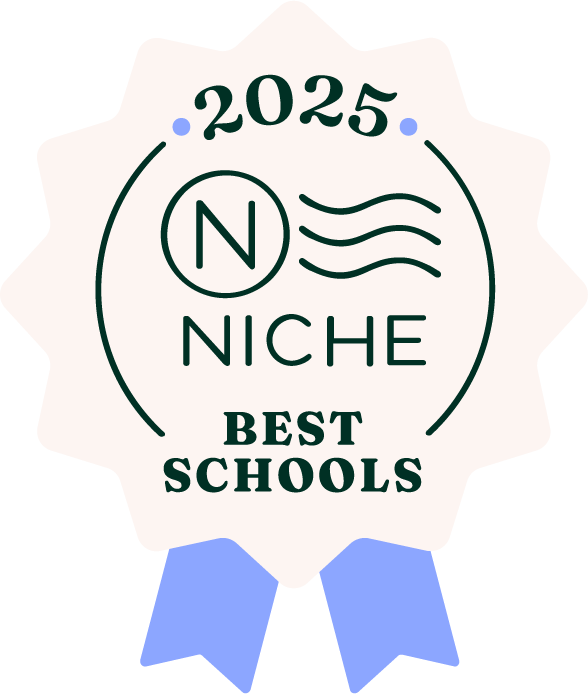My very first year at Greensboro Montessori School, I worked alongside a wise and wonderful teacher, who is also my Montessori mentor. As our year together progressed into late spring, she suggested we teach a unit on the life cycle of the monarch butterfly and sent me afield to pick up a caterpillar tent from a local butterfly farm. It was a curious-looking contraption: a flowering milkweed plant with a gauzy covering. A week into our journey with this kit, my mentor had a family emergency that took her on an unexpected trip overseas ... for four weeks. At a moment’s notice, I found myself entrusted with the care of 12 children; one gerbil (my mentor knew I didn’t do rodents); a ragtag tray of fava beans sprouting in paper cups; and this milkweed plant, the presumed setting for the miracle of metamorphosis. That is, if I could keep it alive. It didn’t take long for me to realize that with this lowly plant came some extraordinary lessons in faith, respect, awe, tenderness, and trust.
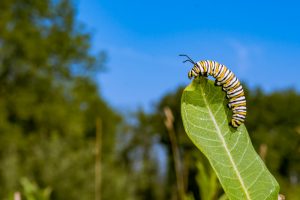 For those uninitiated in the art art of raising caterpillars: they take a while to become visible. A long while. Though we’d been promised that our plant came with a pair of Monarch eggs, those first two weeks rolled by with nary a sighting of the little beasts. Every day we checked for them, and every day I saw the skepticism grow in my students' eyes as I described the wondrous sight we were going to behold. Probably. Eventually. The morning we finally noticed wormholes in the leaves — evidence that our charges were indeed hatched and hungry — felt like waking up to breakfast in bed on your birthday.
For those uninitiated in the art art of raising caterpillars: they take a while to become visible. A long while. Though we’d been promised that our plant came with a pair of Monarch eggs, those first two weeks rolled by with nary a sighting of the little beasts. Every day we checked for them, and every day I saw the skepticism grow in my students' eyes as I described the wondrous sight we were going to behold. Probably. Eventually. The morning we finally noticed wormholes in the leaves — evidence that our charges were indeed hatched and hungry — felt like waking up to breakfast in bed on your birthday.
Once our caterpillars became visible, they grew at a blazing speed, delighting the toddlers with their impossibly lovely stripes and ravenous eating habits. The students relished the idea that these creatures never, ever accepted any food but milkweed. “Wouldn’t you like some pizza, dears?,” I’d ask the worms. “Maybe a nice cup of coffee?” The children would squeal, “NO WAY!,” perhaps reminded of their own choosy appetites. An assortment of suggested names were bandied about, ranging from Lexy to Tiger to Dobo to Burp. (The caterpillars didn’t seem to have a preference.)
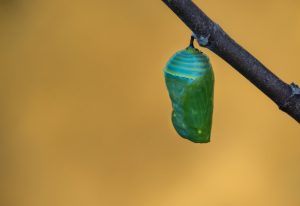 One sunny morning, we found the caterpillars hanging from the leaves in their mysterious “J” formation, the behavior that immediately precedes the formation of the chrysalis. Within hours, they were caterpillars no more. If I had not seen it with my own eyes, I could never have imagined the reverence and care the students extended once this transformation had taken place. They seemed to instinctively know their tiny pets now needed silence and space. Each morning, the toddlers took turns standing guard by the milkweed plant, gazing solemnly at the astonishing beauty of the chrysalises, misting them gently with a spray bottle. Many days of inaction followed ... yet, having awaited their friends’ first emergence, the students now had unwavering patience and faith. Some miracles, they’d learned, are worth waiting for.
One sunny morning, we found the caterpillars hanging from the leaves in their mysterious “J” formation, the behavior that immediately precedes the formation of the chrysalis. Within hours, they were caterpillars no more. If I had not seen it with my own eyes, I could never have imagined the reverence and care the students extended once this transformation had taken place. They seemed to instinctively know their tiny pets now needed silence and space. Each morning, the toddlers took turns standing guard by the milkweed plant, gazing solemnly at the astonishing beauty of the chrysalises, misting them gently with a spray bottle. Many days of inaction followed ... yet, having awaited their friends’ first emergence, the students now had unwavering patience and faith. Some miracles, they’d learned, are worth waiting for.
When the butterflies emerged during the last week of school, we carried them to the playground and prepared to set them free. Before they departed, they allowed each and every toddler to hold them awhile and sing them a send-off song (the choice was painfully obvious: “Let it Go”). When the monarchs finally took to the sky and fluttered toward the Primary garden, I knew the students and I were feeling the exact same mix of elation and heartache. After all, many of our toddlers themselves would soon be flying to the other side of the playground fence, away from the nest of our classroom and our many loving days together.
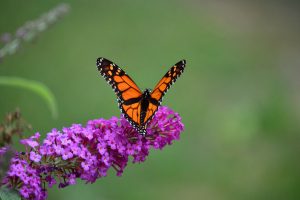 Six years later, having raised monarchs with every single toddler class I’ve taught since that first year, it’s time for my own metamorphosis. I am so excited for the new challenges and relationships that await me as I transition into the director of CASA role at Greensboro Montessori School. Yet there’s something about teaching that simply can’t be matched by any other profession. Year after year, I’ve witnessed the beautiful metaphor of little children caring tenderly for the tiny, fragile caterpillars whose lives begin in our classroom. I hope that’s in small part because they, too, have felt tenderly cared for here; that they understand the reverence and awe a teacher experiences as they watch their students grow, and the bittersweet pride they feel when it’s time to set their students free.
Six years later, having raised monarchs with every single toddler class I’ve taught since that first year, it’s time for my own metamorphosis. I am so excited for the new challenges and relationships that await me as I transition into the director of CASA role at Greensboro Montessori School. Yet there’s something about teaching that simply can’t be matched by any other profession. Year after year, I’ve witnessed the beautiful metaphor of little children caring tenderly for the tiny, fragile caterpillars whose lives begin in our classroom. I hope that’s in small part because they, too, have felt tenderly cared for here; that they understand the reverence and awe a teacher experiences as they watch their students grow, and the bittersweet pride they feel when it’s time to set their students free.
This year, when our current crop of monarchs depart for the great big world outside, we’ll all be ready to spread our wings and join them, together, in flight.
 About the Author
About the Author
Brooke Juneau joined Greensboro Montessori School's Toddler faculty in 2013. She holds her Infant & Toddler (bith to 3 years old) Montessori teaching credential and graduated from Hampshire College with a Bachelor of Arts in education and human development. Brooke is the mother of three boys. Her middle son, Hayden, graduated from Greensboro Montessori School in 2017. Brooke plays the guitar and loves singing with her students. Beginning in the 2019-20 school year, Brooke will be the School's director of CASA.
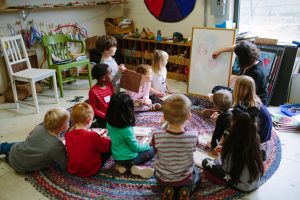 Prekindergarten and kindergarten Primary students love coming to the art studio once a week in the afternoon. Although I am a huge fan of process art where the process of creating is the main focus, I have discovered directed drawing also has its place. At the beginning of class, students meet me on the rug to watch as I draw shapes and lines that turn into an object they can recognize. Then it is their turn to draw. Students have clipboards with drawing paper attached. They follow along as I draw one line (or shape) at a time. Through this directed process, they are learning to find the lines and shapes in things that they see. Then is the fun part when they go to the table and finish their picture with watercolors, oil pastels, colored pencils etc.
Prekindergarten and kindergarten Primary students love coming to the art studio once a week in the afternoon. Although I am a huge fan of process art where the process of creating is the main focus, I have discovered directed drawing also has its place. At the beginning of class, students meet me on the rug to watch as I draw shapes and lines that turn into an object they can recognize. Then it is their turn to draw. Students have clipboards with drawing paper attached. They follow along as I draw one line (or shape) at a time. Through this directed process, they are learning to find the lines and shapes in things that they see. Then is the fun part when they go to the table and finish their picture with watercolors, oil pastels, colored pencils etc.
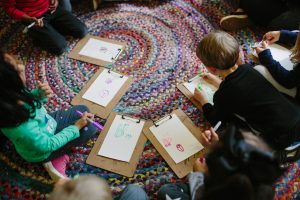 What about students who think they have a hard time drawing? I am constantly reminding all out students how the art studio is a safe place to experiment, and we don’t worry about being perfect. You might hear me saying, “perfect is boring!” Directed drawing breaks down an object into simple lines and shapes, which helps ensure our students' earliest art experiences are positive (so hopefully they will continue loving art as they grow older). Plus, Greensboro Montessori School students are great at asking for help if they feel they need it. As a teacher guide, I am there to encourage and assist when a child asks for help, but I mostly see the students growing in their confidence and having fun as they practice drawing.
What about students who think they have a hard time drawing? I am constantly reminding all out students how the art studio is a safe place to experiment, and we don’t worry about being perfect. You might hear me saying, “perfect is boring!” Directed drawing breaks down an object into simple lines and shapes, which helps ensure our students' earliest art experiences are positive (so hopefully they will continue loving art as they grow older). Plus, Greensboro Montessori School students are great at asking for help if they feel they need it. As a teacher guide, I am there to encourage and assist when a child asks for help, but I mostly see the students growing in their confidence and having fun as they practice drawing.
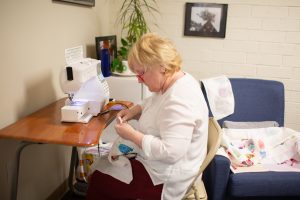 Examples of Primary students' directed drawings were on display at the 2019 Green & White Bash. I worked with YoungDoo Carey on creating an art series based on the four seasons. Students drew snowmen for winter, flowers for spring, ladybugs for summer, and leaves for fall. I gave selected drawings to YoungDoo, who digitized the drawings and created patterns for printing on fabric. YoungDoo then worked with Anne Schroth, owner of Red Canary Studios and a former Greensboro Montessori School parent, to print the patterns on various fabrics. Heather Goggin then used the fabric to create pillows, linen tea towels, and scarves.
Examples of Primary students' directed drawings were on display at the 2019 Green & White Bash. I worked with YoungDoo Carey on creating an art series based on the four seasons. Students drew snowmen for winter, flowers for spring, ladybugs for summer, and leaves for fall. I gave selected drawings to YoungDoo, who digitized the drawings and created patterns for printing on fabric. YoungDoo then worked with Anne Schroth, owner of Red Canary Studios and a former Greensboro Montessori School parent, to print the patterns on various fabrics. Heather Goggin then used the fabric to create pillows, linen tea towels, and scarves.
While process art is at the heart of my teaching, I am finding a balance using both process art and directed drawing. Teaching both techniques is the best way to follow the child.

Katherine Gwynn is the visual arts faculty for Primary, Lower Elementary, and Upper Elementary students. She is a mixed-media artist and her art studio is filled with a variety of materials for creating. Students in her classes are exposed to a wide variety of media, art styles and movements, specific artists, and terminology. She often supports the CASA program with enrichment activities, and in addition to her regular class, she maintains open studio time for Upper School students who are often engaged in elaborate projects. Katherine holds two bachelor's degrees: one in interdisciplinary studies in art and design from the University of North Carolina at Chapel Hill and another in social work from the University of North Carolina at Greensboro.
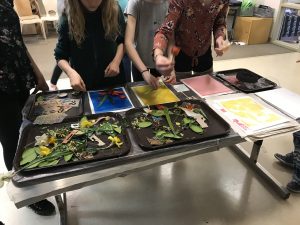 For this year’s Green and White Bash, Upper Elementary students took inspiration from the beauty and complexity of Greensboro Montessori School's gardens. As one of the room parents in Upper Elementary (my daughter, Stella, is a sixth-year student), I had the opportunity to work with my fellow room parents, Catherine Wolfe and Flory Hénon, to develop the classroom auction project. We chose to invite a collaboration between Environmental Education, Visual Art, and Upper Elementary to celebrate spring and to honor the spirit of Maria Montessori’s words about the importance of building a connection between children and nature. In 1936, Montessori wrote in The Secret of Childhood:
For this year’s Green and White Bash, Upper Elementary students took inspiration from the beauty and complexity of Greensboro Montessori School's gardens. As one of the room parents in Upper Elementary (my daughter, Stella, is a sixth-year student), I had the opportunity to work with my fellow room parents, Catherine Wolfe and Flory Hénon, to develop the classroom auction project. We chose to invite a collaboration between Environmental Education, Visual Art, and Upper Elementary to celebrate spring and to honor the spirit of Maria Montessori’s words about the importance of building a connection between children and nature. In 1936, Montessori wrote in The Secret of Childhood:
"There must be provision for the child to have contact with nature, to understand and appreciate the order, the harmony and the beauty in nature … so that the child may better understand and participate in the marvelous things which civilization creates."
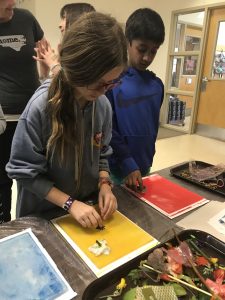 Our exploration of “the harmony and the beauty in nature” took the form of a printmaking workshop. Using gelatin plates, soy-based inks, found objects, and baskets of garden finds, we experienced nature’s beauty and fragility firsthand through art-making. Gelatin (also called “gel” or “gelli”) printmaking is a fun and safe monotype printing method used by both professional artists and weekend crafters. It is particularly well-suited to children, because gel plates and the water-soluble inks used in the printing process are nontoxic. It is also easy to achieve beautiful results, because the gel material is spongy and shows even small details of the objects being printed.
Our exploration of “the harmony and the beauty in nature” took the form of a printmaking workshop. Using gelatin plates, soy-based inks, found objects, and baskets of garden finds, we experienced nature’s beauty and fragility firsthand through art-making. Gelatin (also called “gel” or “gelli”) printmaking is a fun and safe monotype printing method used by both professional artists and weekend crafters. It is particularly well-suited to children, because gel plates and the water-soluble inks used in the printing process are nontoxic. It is also easy to achieve beautiful results, because the gel material is spongy and shows even small details of the objects being printed.
Our printmaking day began in the morning with Eliza Hudson, Greensboro Montessori School’s lead environmental educator, taking several student volunteers into the Upper Elementary garden to collect fresh materials. They gathered an exciting assortment of flowers and herbs bursting with the colors and textures of spring. Later in the morning, I arrived to set up our printmaking workshop. As I prepared the area for working, many curious students stopped by to see what was happening. Some poked at the squishy plates; others picked through the assortment of materials on display. I enjoyed seeing their curiosity piqued, even though we had yet to begin the actual printmaking. Catherine arrived soon after me, and together we inked each of three gel plates with a different color. We chose deep blue, reddish-pink, and an ochre yellow — all the way around the color wheel! — to represent the wide spectrum of colors found in nature. Once everything was ready to go, the teachers sent us groups of students by grade level during their recess.
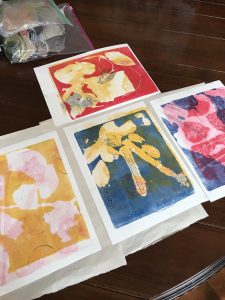 The sixth-grade students arrived first. They were quick to organize themselves: three students lined up in front of the gel plates while the other students crowded around to watch. They chose garden materials and recycled objects, then arranged them into compositions on the inked plates. We took preliminary prints, with the objects still on the plates, that resulted in strong, saturated colors and amorphous drifts of white left behind where the objects blocked the ink. We discovered that these prints made perfect background layers for prints taken of the detailed images left in the ink once the objects were removed. Sometimes enough ink remained on a plate after pulling these two prints to allow for a third “ghost” print that the students could use as yet another layer. In this way, each final print was created as the result of multiple rounds of printing through student collaboration. The shapes and colors on each print intertwined to create a beautiful and organic complexity, mimicking that which is found in nature. The students enjoyed the process of working together with their fellow students, and over time, began to design their prints collectively, keeping all of the layering possibilities in mind.
The sixth-grade students arrived first. They were quick to organize themselves: three students lined up in front of the gel plates while the other students crowded around to watch. They chose garden materials and recycled objects, then arranged them into compositions on the inked plates. We took preliminary prints, with the objects still on the plates, that resulted in strong, saturated colors and amorphous drifts of white left behind where the objects blocked the ink. We discovered that these prints made perfect background layers for prints taken of the detailed images left in the ink once the objects were removed. Sometimes enough ink remained on a plate after pulling these two prints to allow for a third “ghost” print that the students could use as yet another layer. In this way, each final print was created as the result of multiple rounds of printing through student collaboration. The shapes and colors on each print intertwined to create a beautiful and organic complexity, mimicking that which is found in nature. The students enjoyed the process of working together with their fellow students, and over time, began to design their prints collectively, keeping all of the layering possibilities in mind.
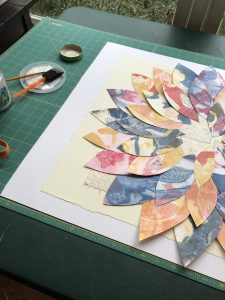 Upper Elementary students of all levels enjoyed the activity and many wanted to spend additional time making prints. I loved watching their faces as they pulled a fresh print off the plate. Their eyes would grow with excitement, and occasionally I’d even hear a gasp. The teachers were equally fascinated by the process. Katherine Gwynn, Greensboro Montessori School’s visual arts faculty, along with Eliza and the Upper Elementary faculty visited to observe and participate. Cathy Moses took photos and John Archambault partnered with a student to make a set of prints. When all of the students were finished with their work, we cleaned the area, and I packed up the prints to take home. In my studio, I combined and transformed them into the petals of a large, three-dimensional flower — a nuanced and strikingly beautiful tribute to spring that showcases the diversity found in nature and also among the children who dwell in it here at Greensboro Montessori School.
Upper Elementary students of all levels enjoyed the activity and many wanted to spend additional time making prints. I loved watching their faces as they pulled a fresh print off the plate. Their eyes would grow with excitement, and occasionally I’d even hear a gasp. The teachers were equally fascinated by the process. Katherine Gwynn, Greensboro Montessori School’s visual arts faculty, along with Eliza and the Upper Elementary faculty visited to observe and participate. Cathy Moses took photos and John Archambault partnered with a student to make a set of prints. When all of the students were finished with their work, we cleaned the area, and I packed up the prints to take home. In my studio, I combined and transformed them into the petals of a large, three-dimensional flower — a nuanced and strikingly beautiful tribute to spring that showcases the diversity found in nature and also among the children who dwell in it here at Greensboro Montessori School.

Acknowledgements
This project came together with the help of several important collaborators. First, thank you to Eliza Hudson for taking volunteer students into the garden on a beautiful spring day to collect flowers and herbs, the stars of this project! Thank you also to Katherine Gwynn for her enthusiasm and for placing an emergency order of paper for us. Many thanks to the Upper Elementary teachers, Cathy Moses, John Archambault, and Tessa Kirkpatrick, for weaving our project into a busy school day. And, finally, thank you to my year-long collaborators in Upper Elementary, fellow room parents Catherine Wolfe (who is also the division coordinator) and Flory Hénon, for their excitement about the project and their support during the printmaking workshop.
 About the Author
About the Author
Gina Pruette is a parent and substitute teacher at Greensboro Montessori School. In addition to helping at the School, Gina enjoys tackling creative challenges as a freelance copy editor, writer, and visual artist. She is writing her first book, a guide to collaborative art-making with children, with the hope of encouraging more parents and educators to make art with the children in their lives. This summer, Gina will teach bookbinding methods during the School’s GMS Press book-themed camp. You can find her on Twitter and Instagram. She holds a bachelor of arts from the University of Pennsylvania.
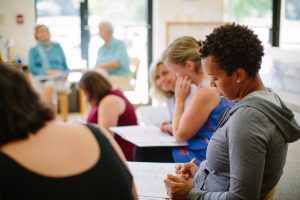 Why is professional development so important at Greensboro Montessori School?
Why is professional development so important at Greensboro Montessori School?
We talk about our students being lifelong learners.
We always want them to discover, to ask questions, to think new things, and to have new thoughts. Especially at a Montessori school, we believe the adults who help guide our students’ education also need to be lifelong learners. We, too, should ask questions and think and try new things, just as we ask our students.
As professional educators, we are always watching for chances to learn: observing students or other teachers, having that unexpected conversation with a colleague, or connecting with professionals and researchers and new theories through more organized professional development — conferences, workshops, speakers, or graduate classes. We spend a lot of resources on professional development because we believe our School is only as good as our professional educators are.
The Montessori Event
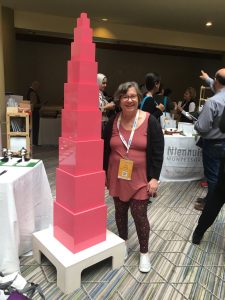 Our crew was quite fortunate to have an amazing professional experience recently. A trip up to Washington, D.C. was the setting …
Our crew was quite fortunate to have an amazing professional experience recently. A trip up to Washington, D.C. was the setting …
For four days 26 faculty and staff from Greensboro Montessori School joined 4,400 other Montessori educators from around the world. We were all there for the American Montessori Society annual international conference. To have 26 of us together at the same place and same time at such a high-quality professional conference is truly spectacular. We thought together, asked questions, learned new things, built community amongst ourselves, and talked about how we further build community amongst our students and families. Being together with the 26 of us allowed for unprecedented synergy; for deep conversations about specific Greensboro Montessori School curricula or programs; for conversations about new ideas for which there's never time in the midst of our normal school days; and for space in our minds and hearts to dream about what we want our School to be. (Oh, yeah, we did laugh a little bit, too.)
A unique opportunity like this allows us, individually, to be better educators, and for us, collectively, to make our School stronger ... ultimately providing a better educational experience for our students. Every professional development workshop or seminar our faculty and staff attend is for the benefit of our students. Our professional development is for our students.
What did we Learn?
Since our time in Washington, D.C., we have already begun to put to use much of what we learned and thought. The turn-around practical value is very high at a conference which is so focused on our exact curriculum and pedagogy. The 26 of us expressed our reflections in a shared space. Here are a few things we wrote:
- "Just when you think you’ve seen it all, someone shows you a new way to use a [Montessori] material. This made me think of other ways I could use the materials..."
- "Something new to start doing is taking more time to create a comfortable, prepared environment; I would like to involve the students more consistently on these decisions..."
- "I’d like to think more project-based learning and how it does fit (perfectly) with Montessori philosophies, especially in the Upper School; I talked with the director of the Riley Institute that does all the Montessori research at Furman University about a new workshop they created about project-based learning, and she said she might be able to come up to Greensboro to give a workshop for us..."
- "Creating an empowering environment for my advisee group [in Junior High]; finding and providing activities that help each [student] to know [their] own strengths and weaknesses..."
- "Our Land program and microeconomy are incredible, everyone else seems to really struggle with [adolescent] programs..."
- "Observation; I had forgotten just how fundamental and essential it is to sit and observe; in order to appreciate this process, it might be helpful for the rest of the team in the classroom to have their own time to observe as well; I remember now that we must make this a priority..."
- "In the storm of adolescence, we must be the calm… Don’t get on the rollercoaster with the students.”
- Some of the titles of our favorite workshops include: “What makes a Secondary Montessori Program Unique?,” “Enhancing Student Engagement in Secondary [Adolescent] Classrooms,” “Critical Partnerships for Children with Exceptionalities,” “Parent Education That Will Keep Them Coming Back For More!,” and “Visual Arts in Socratic Seminar.”
Thank you for supporting our faculty and staff in our own professional development. It only makes us better educators, and our School a better one for our students.
Everything we do, professional development included, is for our students.
Brooke Juneau is a living legend at Greensboro Montessori School. Beloved by her students, families, and fellow members of the Tod Squad (the name our Toddler faculty have affectionately given themselves), Brooke is a servant leader and advocate for children and families.
Brooke is currently the lead teacher in our Academic-Day Toddler classroom, Toddler division chair, and co-chair of our dual reaccreditation with the American Montessori Society (AMS) and Southern Association of Independent Schools. In February, we announced that Brooke will spearhead our after-school and summer programming as our director of CASA beginning in the 2019-20 school year. While Brooke will deeply miss working with our Toddler students and teachers, she plans on visiting the Toddler classrooms often. Plus, as an AMS-credentialed educator in Infant and Toddler Montessori education, Brooke will remain a invaluable resource to our Toddler families and faculty.
As she transitions into the director of CASA role, Brooke is looking forward to expanding her relationships with Primary, Elementary, and Junior High families and reconnecting with many students who began with her in our Toddler program. She’s also patiently waiting (with open arms, of course) for her current Toddler students to grow, transition to Primary, and perhaps join our CASA program.
Professional and Personal Work
Last fall, Brooke presented at the North Carolina Association of Independent Schools annual conference. Her topic was entitled “In this Together: Navigating Difficult Conversations with Families.” The seminar focused on nurturing the positive parent-teacher relationships necessary to successfully guide students through their academic journey.
More recently, Brooke presented at the AMS annual conference, an international conference of over 4,000 Montessori educators. “Partnering with Parents of Children with Special Needs” was a 75-minute workshop, during which she led participants through activities designed to help them better understand the perspectives of parents who have children with developmental, behavioral, and/or learning challenges. She reviewed the distinct stages of grief families may experience after a child’s diagnosis, why communication may be difficult with those families, and ways to frame sensitive, fruitful conversations about children’s needs.
Brooke’s expertise in partnering with families and improving outcomes for children with exceptional needs stems from her personal experience. Brooke and her husband, Jason, have three children. Harper will be in Upper Elementary next year, and Hayden graduated from Greensboro Montessori School in 2017 and is currently a sophomore at Weaver Academy. Their oldest, Riley, is a young adult successfully living and navigating the world with dual diagnoses of autism and Joubert syndrome. Brooke and Jason have personally lived through the stages of grief she reviewed in her AMS presentation and the steadfast work of advocating for Riley and their family.
Education and Career
Brooke has also studied and worked in human development her entire life. She holds a Bachelor of Arts in education and human development and has completed graduate coursework in early childhood education at Wheelock College. She also completed a rigorous one-year, graduate-level program to earn her AMS teaching credential.
Brooke began her teaching career managing early childhood programs in the Boston and Raleigh areas. Immediately prior to joining Greensboro Montessori School, Brooke worked for eight years as a parent liaison at the Family Support Network of Central Carolina, where she personally assisted families in finding and accessing services, support groups, school advocacy, and other needed resources for their children with special needs. She also trained and managed volunteers to serve as parent matches for families whose children were newly diagnosed.
Get to know Brooke
If you haven’t had the pleasure of reading a newsletter or progress report written by Brooke, you’re missing out on one of her other talents. Brooke is a prolific and exquisite writer, capturing the beauty of children, the prepared environment, and the everyday occurrences when the two interact — just as they should in a Montessori classroom.
While there is so much more to Brooke, we encourage you to form your own relationship with this master teacher and parent. Just like all our faculty and administrators, Brooke is available via email or by calling the Front Office at 336-668-0119.
“Turn it, and turn it, and turn it, and turn it, and turn it, and turn it, Compost Cake!”
“Pile it high, pile it high, pile it high, Compost Cake!”
If you’ve heard this song about compost all around campus this fall and winter, it’s because we got new compost bins in the Primary and Lower Elementary gardens! Why did we get new bins, you might ask? Two reasons:
- We needed more space for the volume of organic waste we produce (a combination of garden waste and food scraps from the students' lunches and snack preparation)
- We wanted to try a more interactive, faster, and developmentally appropriate compost model for our younger students.
So what did we get? If you visit the Primary and Lower Elementary gardens, you’ll see some giant green cylinders sitting on a rotating axis. These compost bins are called tumblers. Tumbler compost models allow students of all ages to spin the compost (working those gross motor skills), in addition to speeding up the composting process. In our old bins, it took at least a year for our food waste and garden scraps to decompose fully, we'll make finished compost in as little as two weeks. Cheers to that!
What is Compost?
Compost is the product that’s left after organic matter has fully decomposed. It’s also called humus. Human-made compost comes from carefully mixing food and garden waste materials — ingredients high in either nitrogen or carbon — and placing them in an environment where they can decay. When the decaying process has gone well, we put the finished compost, or humus, back into the garden soil and grow healthier plants by improving soil fertility.
Why do we compost at Greensboro Montessori School?
For starters, compost has a longer ground-life than other fertilizers. It lasts longer in soil than crop residues or animal manures that degrade rapidly here in the humid Southeast. This longevity makes for healthier plants and food crops. Composting also reduces our waste throughout campus. By diverting organic matter from the landfill and into a closed-loop cycle, we transform our “waste” into a fertilizer for our gardens and food for the microorganisms that live in the soil beneath us. We also save money by eliminating the need and associated cost of additional soil fertility inputs. And let's not forget, composting is just plain fun!
Can you think of any other reasons to compost? Maybe, that by doing it, we are feeding the worms our Toddlers so adore? That it’s a responsible use of resources? That it's a project-based way to teach science? Share your thoughts with us! And, if you want to learn more, please join us at our next Community Garden Workday for more composting tips and tricks with our environmental education faculty. We’d love to have you.
If you're interested in learning more about the science of composting, read this article from Live Science.
 About the Author
About the Author
Eliza Hudson is Greensboro Montessori School's lead environmental educator. Eliza holds her bachelor's degree in biology from Earlham College in Richmond, Ind. She has built and tended school gardens, taught hands-on cooking lessons and connected local farms to school programs working for FoodCorps. Prior to joining Greensboro Montessori School in 2014, Eliza was a classroom and after-school assistant at the Richmond Friends School, a farm intern at a family-owned farm in Ohio, and served as assistant director at a summer day camp in an urban community garden in Durham.
Greensboro Montessori School has taught environmental education since 1995 and has been permaculture gardening on its campus since 1997.
Greensboro Montessori School's Junior High faculty and students recently partnered with North Carolina A&T State University on a research project involving shiitake mushrooms. Shiitakes are edible mushrooms high in vitamins and chock-full of other health benefits. They're native to Eastern Asia and sold in farmers markets throughout the U.S. for upwards of $16 per pound. Recently, our Junior High students wanted to learn more about these delicious fungi.
On Fridays, our Junior High students participate in their careers program. Careers is one of Greensboro Montessori School's differentiating aspects of our adolescent curriculum. It equips students with real-world management skills by charging them with running a micro-economy. Students research and participate in various career teams such as finance, management, farming, culinary arts, research, design, production, and publishing. These career teams buy and sell from each other.
The farm team harvests produce from the School's permaculture gardens and sells it through their business, Maria's Market. Merging their science and careers curricula, the students decided that growing shiitake mushrooms to sell at Maria’s Market would be a worthwhile endeavor. They would be able to learn about the fungi kingdom, saprophytic organisms, mycelial networks, the medicinal value of mushrooms, and the details of producing and selling a high-value commodity item.
To help guide our students, Junior High science faculty, Tim Goetz, reached out to faculty at N.C. A&T. He asked if they would be willing to provide expert advice to our students, and they welcomed the opportunity to partner with us. This project-based science project began with a visit from Felicia Anike, a research specialist at N.C. A&T studying mushroom science and fungal biotechnology. She was joined by Melvin Mensah-Bonsu, a graduate research assistant, and Janelle Robinson, a graduate fellowship student. Felicia, Melvin, and Janelle gave a presentation to our Junior High students on the history, growing, and uses of shiitake mushrooms. They also demonstrated the proper drilling, inoculation, and waxing of the white oak logs on which these mushrooms grow.
The week following the presentation, all of our Junior High students cycled through the shiitake inoculation project. They drilled holes into freshly cut white oak logs sustainably harvested from Greensboro Montessori School's campus. Then, they plugged each hole with the spawn. Finally, they covered the holes with wax to keep the spawn safely in place and protected from other opportunistic fungi species.
The inoculated logs will sit for around six months as they become fully inhabited by the shiitake mycelial network. Students will then stack the logs and wait for fruiting to begin. It will take around eight to 12 months for the logs to begin producing shiitake mushrooms, but then, we can expect them to fruit for five to six years.
N.C. A&T gave us several different varieties of shiitake mushrooms, and students will be tracking how each performs, in what seasons they fruit, and other specific data points, which we will relay back to the team at N.C. A&T. Our students are excited to track the progress of the logs, and because the logs will fruit for so long, the logs will benefit future students as well. Mostly, we are excited to participate in project-based learning that has purpose and real-world benefits to the community. As our students research, manage, and harvest shiitake mushrooms from the logs, they will also provide a unique and healthy consumable product to the community.
Project-based learning ... this is how we teach science at Greensboro Montessori School!
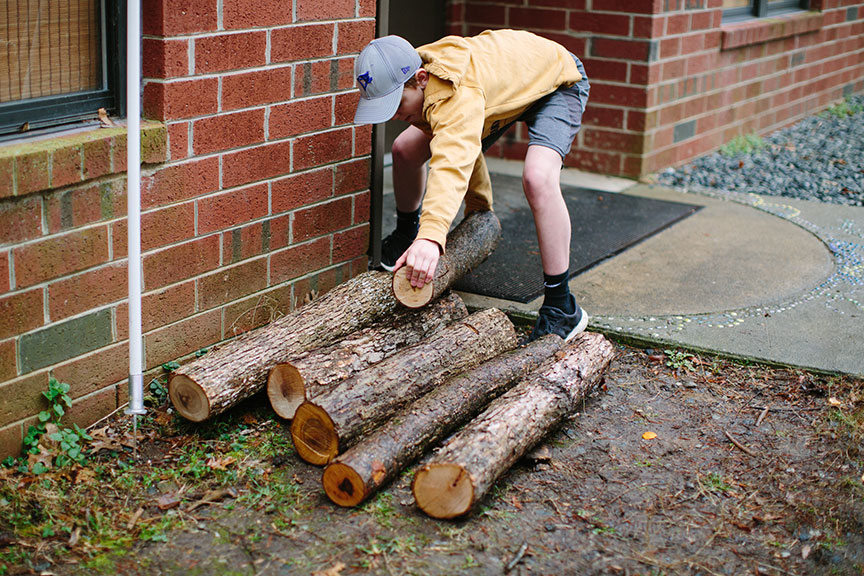
A Junior High student collects a sustainably harvested white oak log to be inoculated with shiitake mushroom spawn.
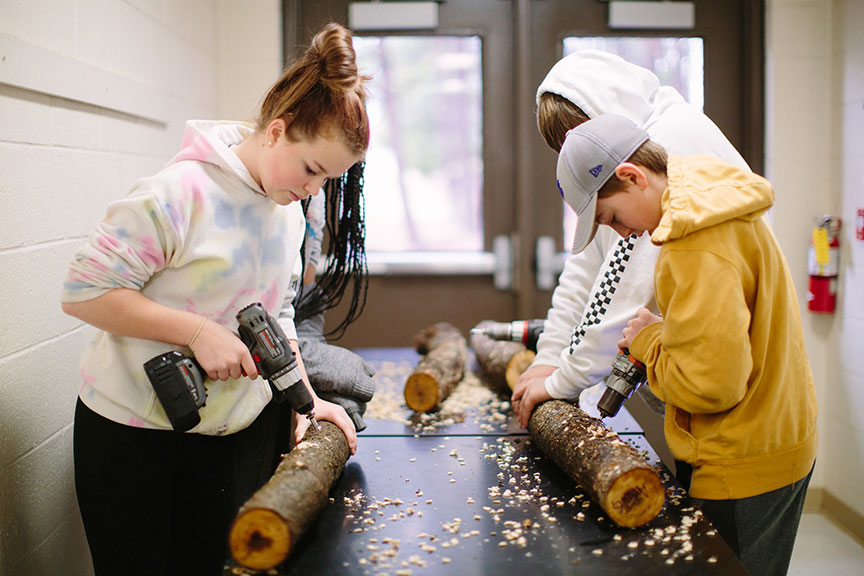
Using best practices they learned from researchers at N.C. A&T, students drill holes into the white oak logs.
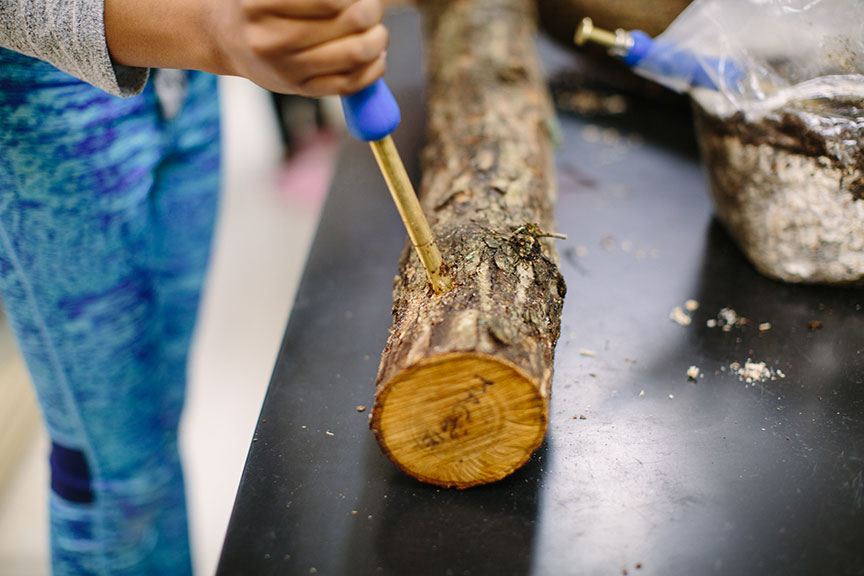
Students inoculate logs by transferring shiitake mushroom spawn into the holes.
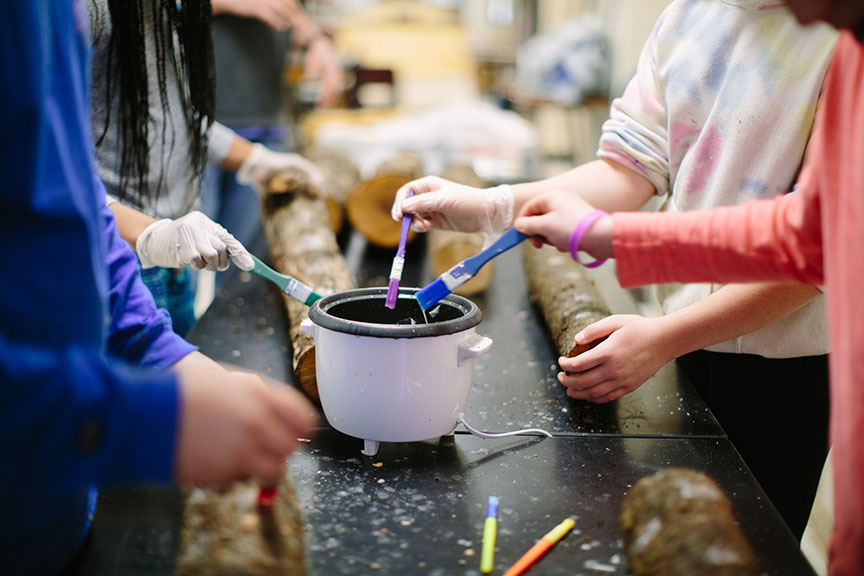
Students use wax to seal the holes, keeping the spawn firmly in place and protecting the spawn from other opportunistic fungi species.
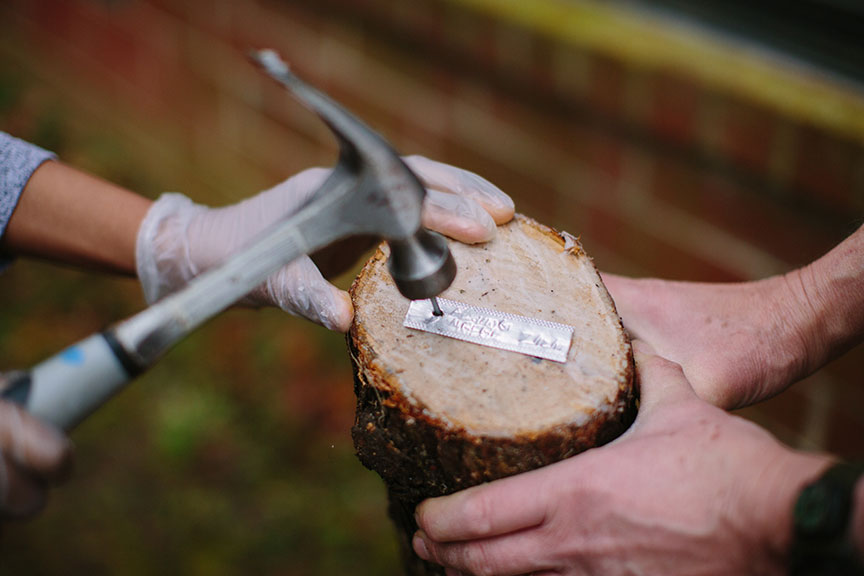
Students label each log, so they can report accurate data points about each mushroom varietal back to N.C. A&T.
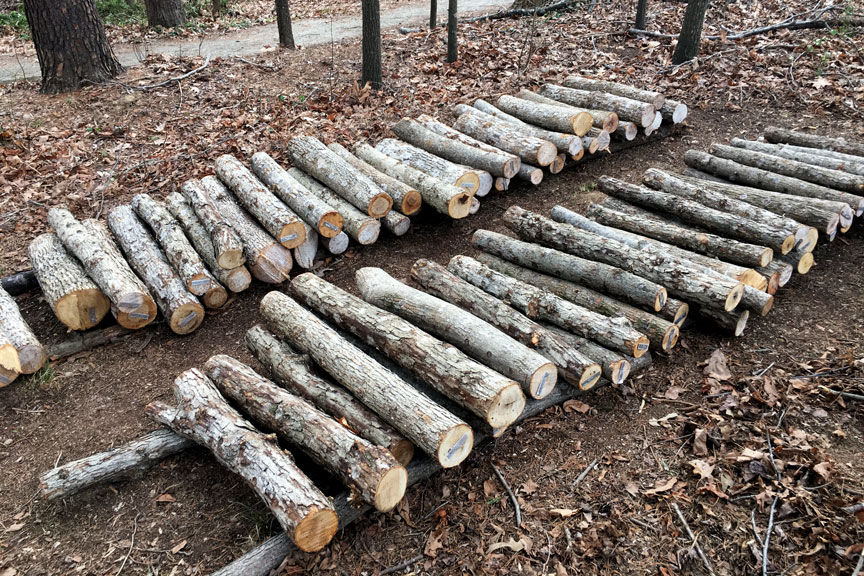
The inoculated logs will sit for around six months as they become fully inhabited by the shiitake mycelial network.
Dr. Omoanghe Samuel Isikhuemhen works in the department of Natural Resources and Environmental Design and is a professor of family and consumer sciences at N.C. A&T. Dr. Isikhuemhen's work centers around mushroom science and fungal biotechnology, and he leads research on mushroom science, production, and use in food and supplements for humans and farm animals. The members of his team have trained farmers to become mushroom growers, authored journal articles, and supervised student research in exotic mushrooms, truffles, and other related fungal biotechnologies. Greensboro Montessori School's Junior High students are the first group of adolescent-age students his team has trained in shiitake mushroom production.
If you were lucky enough to be at Greensboro Montessori School last Thursday night, or with us via the livestream, you were treated to quite a show! Simply put: our fourth, fifth, and sixth graders' 17th annual Fare Faire production, “Back to Families Feudal,” was fantastic: high-quality, well-researched, technically sound, aesthetically powerful, and laugh-out-loud funny.
Fare Faire is a rite of passage for Upper Elementary students at Greensboro Montessori School. This annual theatrical production integrates students’ language arts, history, and performing arts curriculum. As students learn about the medieval historical period, they also read related literature and work together to bring a story to life on stage. The name, “Fare Faire,” is a creative play on words which highlights the communal meal Upper Elementary students and their families enjoy before the student-led performance - this year the potluck dinner of years' past gave way for a sweeter dessert feast.
And with all this work, all this project-based learning, all this technical and logistical demand of putting on a 31-person theatrical production, I have to ask: where were the teachers? I barely saw them all night.
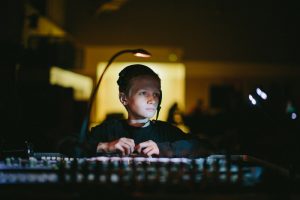 I heard Cathy Moses and Tessa Kirkpatrick may have been backstage to reassure a few worried students or help with a tricky transition; and I saw Jonathan McLean and John Archambault lingering over at the light and sound board, and even once saw them each use the spotlight, but I think it was only because the sixth grader running the sound board told them what to do. The rest of the time, I saw the teachers pretty much relaxing and enjoying the show, sometimes just leaning against the bleachers or even sitting in the audience. When I complimented them on the show, they said, “Yes, the students did a great job.” While I cannot underscore the intense, long, and passionate hard work the faculty have put in over the past three weeks, one thing was crystal clear Thursday night: the teachers were not in charge of this show. The students were.
I heard Cathy Moses and Tessa Kirkpatrick may have been backstage to reassure a few worried students or help with a tricky transition; and I saw Jonathan McLean and John Archambault lingering over at the light and sound board, and even once saw them each use the spotlight, but I think it was only because the sixth grader running the sound board told them what to do. The rest of the time, I saw the teachers pretty much relaxing and enjoying the show, sometimes just leaning against the bleachers or even sitting in the audience. When I complimented them on the show, they said, “Yes, the students did a great job.” While I cannot underscore the intense, long, and passionate hard work the faculty have put in over the past three weeks, one thing was crystal clear Thursday night: the teachers were not in charge of this show. The students were.
In my 20 years of independent school education, I’ve seen plenty of wonderful “student-led” productions. But not until our very own Fare Faire, have I seen a show so incredibly run by the students. When we walked into the Gym, it was a student decorations manager who had transformed the space into a medieval stage; where there was a line forgotten, it was a student director who whispered a line; when there was a costume glitch, it was the student costume manager who responded; whenever someone missed a cue to come on stage, there was a student stage manager giving them a gentle shove onto the stage; or when one of the mics crackled, it was the student sound manager who adjusted the board settings.
Sixth graders have the opportunity to step into leadership roles for the production. Stella and Mahinda were the directors. Leila the stage and decorations manager. Whitley was in charge of costumes, while she and Stella also worked with Jillian Crone to spearhead marketing for the show. Andrew was in charge of sound and lights, while Mohamed was in charge of microphones. Dalia was in charge of props, and Kylee in charge of photography. Leading their fourth and fifth grade peers in producing Fare Faire is a capstone experience for these students. They had been preparing for that responsibility and honor all throughout the first two years of their three-year cycle.
Our three-year Upper Elementary program has always delivered a strong and unique learning experience for our students. Building on the Montessori skills and foundations that have been developed throughout the Primary and Lower Elementary divisions, our fourth through sixth graders are empowered to come into their own as they transition to the Upper School. They take responsibility for their learning in real-life applications; they develop all the academic and social-emotional skills they need to thrive in life; and they learn who they are and how they will step into the world. It is a critical time in the students’ development. And it is big work.
And that big work is guided by a group of inspired and hard-working “teacher-guide-people,” as the faculty sometimes call themselves. Each subject matter experts themselves, they know that so much of the Montessori approach is correctly and carefully setting up the prepared learning environment to guide the students to their own success. With most traditional schools, and even some great schools that try to be more innovative, the model is teachers as the "sage on the stage," filling students with facts and information; not at our school. It is teachers as guides, teachers as inspirers, teachers as coaches, and teachers as expert listeners, researchers, and observers to see what each and every student uniquely needs.
So, where are the teachers?
They are there, every single step of the way, knowing how to both nurture and challenge, knowing how to inspire and empower students to do the work themselves, and knowing when to step back and let the students take ownership and responsibility for their own work, for their own success, and for their own theatrical production, as was the case during the simply fantastic Fare Faire production on a recent and chilly Thursday night in January.
Dear Friends,
A very Happy 2019 to you all! I wanted to send a personal note of thanks to each and every one of you for your contributions to our School. Whether you donate your time, your talent, or your treasure, every gesture is appreciated and celebrated.
As our children are busy doing their important work in their classes, the GMSCA is also doing our important work cultivating and supporting a vibrant and engaged parent community. Looking ahead, we will have many opportunities to get together to support our children, our faculty, and each other. Keep a look out for these upcoming events - we hope you'll find there's something for everyone!
- No matter how old your children are, everyone is welcome to attend any of our School's extraordinary stage productions. Upper Elementary just produced and performed "Back to Families Feudal," the 17th annual Fare Faire. Primary students will take center stage for their Winter Singalong on Friday, February 8 at 9 a.m., and Lower Elementary will celebrate customs from around the world in their Festival of Lights on Tuesday, March 5 at 6:30 p.m.
- On Friday, February 1, join us in the Gym from 4 to 7 p.m. for our second annual community volleyball tournament. Parents vs. staff vs. alumni vs. students will compete to see whose volleyball skills reign supreme..
- The GMSCA Basketball Jam is Saturday, February 9 from 9 to 11 a.m. This family-friendly event will offer plenty of games for kids, a three-point contest for adults, snacks for the whole family, and more.
- Later in February, we'll invite you to donate snacks for our teachers to enjoy between their parent-teacher conferences on Thursday, March 7 and Friday, March 8.
- Our next GMSCA Family Dinner is Monday, March 11. Join us anytime from 5 to 7:30 p.m. for a a casual, family-friendly dinner together at Cugino Forno.
- The Spring Community Garden Workday is on the books for Saturday, April 6 at 9 a.m. Come one, come all and enjoy the beauty, fun, and flavors of our blooming gardens.
- Join your fellow parents for a night out at the Green & White Bash on Saturday, April 13 in the Gym. This annual gala and silent auction promises to be a night to remember!
See you in our community, whether we're enjoying a student performance at school or breaking bread together at a local restaurant!
Karen Kelly,
GMSCA Lead Coordinator
To have Greensboro Montessori School's academic calendar (and other school events) automatically sync with your personal calendar, subscribe to our school calendar. To ensure you the most relevant events to your family get pushed to your calendar, we encourage you to customize your subscription based your child's division.
- Visit our online calendar.
- Find the "Categories" filter sitting on the left side, just above the calendar.
- Use the drop-down menu to select your child's division.
- For Toddler, please find and select your child's specific classroom.
- If your have children enrolled in more than one division, please select all applicable divisions.
- Select "GMS Athletics" to also subscribe to the Panthers' game schedule.
- Scroll down to the bottom right corner and click "Subscribe to filtered calendar."
- Select your desired calendar app, and follow the remaining prompts to complete your subscription to the GMS calendar.




